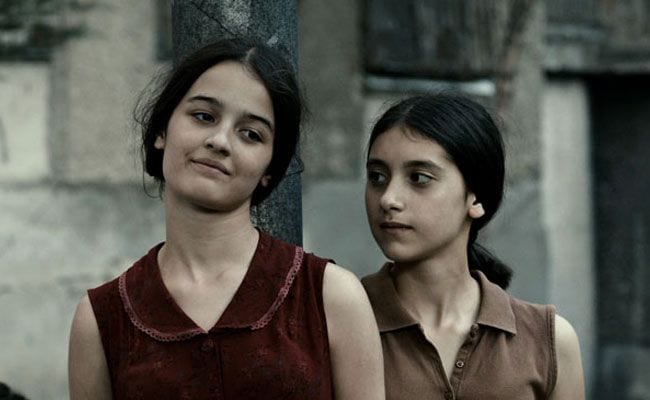
“What do you think it means when a person gives you such a thing?”, Natia (Mariam Bokeria) asks her best friend Eka (Lika Babluani). The thing is a handgun, presented to 14-year-old Natia by Lado (Data Zakareishvili), a boy she likes. The girls walk as they talk, the camera following, sometimes alongside them and sometimes trailing behind, as they make their way through narrow streets in Tblisi. “I don’t want to insult you or scare you,” says Eka, “but that guy really loves you.”
The girls do their best to sort out such meanings in In Bloom (Grzeli nateli dgeebi) in 1992’s Georgia, only recently independent of Russia and immersed in civil war. While Tblisi is removed from current fighting in Abkhazia, Natia and Eka struggle to sort out their relations to men and boys who are, in turn, shaped by both the depressing myths and ongoing tolls of war. Their regular waits on line at the bread truck are chaotic, neighbors pushing and yelling, fearful and angry. At school, the girls do their best not to hear their teacher complaining about the “thieves and scoundrels” who go to war, instead focusing on new dresses or pop songs they like.
At home, each girl contends with daily drama. Natia’s father (Temiko Chichinadze) argues loudly and repetitively with her mother (Tamar Bukhnikashvili) over his drinking; Eka’s father is in prison, and now that she’s hearing rumors that he’s killed another man, she’s stopped going for visits with her music teacher mother, Ana (Ana Nijaradze) and younger sister (Maiko Ninua). When Ana asks, “Why should I tell him you didn’t come?”, her daughter averts her eyes and murmurs, “Tell him I had a fever.”
The lie is a helpful metaphor here, with adults wearied by constant loss and dread and children infected as well, coming up in a world where traditions offer order, if not exactly fulfillment or hope. For girls, that order means multiple forms of submission, whether it’s Eka suppressing her instinct to fight back when the big bully Kopla (Giorgi Aladashvili) routinely bothers her on the way home. When Natia sees this, she offers her gun as a solution: “I’m not telling you to kill him, just scare him,” she says, “We have it for a reason, to teach him a lesson so he doesn’t dare do it again.” Eka resists, but the image of these little girls trading the gun back and forth in the school bathroom, arguing while they hold the door shut against classmates pushing at it from the hallway, is certainly striking. The space they inhabit is small enough, but more distressing, the banging on the door is simultaneously banal and worrisome.
Based on the childhood experiences of co-director Nana Ekvtimishvil, In Bloom reveals how such tensions are only exacerbated as girls reach the age they might be married, namely, 14. As much as Natia and Lado might like each other and even hope to marry, when he leaves for a few months to work in Moscow (he’s several years older than she is), another neighbor, Kote (Zurab Gogaladze), presumes she’ll marry him (he’s been leaving her flowers on the stairway banister at school, gestures she’s consistently rebuffed). His presumption takes a particularly violent and frightening turn when Kote and his fellow self-styled toughs snatch Natia off the street in a car, in front of Eka, whose efforts to fight them are not only futile but observed by all the adults who are waiting with the girls in the bread line. It’s a terrifying scene, the usual bread line pushing and yelling transformed into assault and (off screen) rape, leaving Eka alone and horrified, accusing her neighbors of being cowards and “sons of whores” and worse. When one of the men steps up and slaps her hard across the face, the women mutter, but, torn between the horror and familiarity of what’s happened to Natia, between their resentment of Eka and their fear of the man who hits her, they do nothing.
This is what’s at stake in In Bloom. Again and again, the girls see that they can do nothing, that they must conform to tradition — that is, marry the men who claim them — and then act out their inevitable bitterness in endless arguments at home. If the gun means too much, too traditionally, Eka and Natia fight back in their own ways, and the film renders their shared, ever expanding energies with remarkably intimate, mobile framing. The girls, being 14, are in a kind of perpetual motion, and as they run through city streets, apartment hallways or even open fields, the camera pans along at a short distance to show sunlight and trees, or sometimes follows directly, just over Eka’s shoulder. The delicate ambiguity of these images, asking you to guess what might come next, reveals all kinds of possibility.


![Call for Papers: All Things Reconsidered [MUSIC] May-August 2024](https://www.popmatters.com/wp-content/uploads/2024/04/all-things-reconsidered-call-music-may-2024-720x380.jpg)



